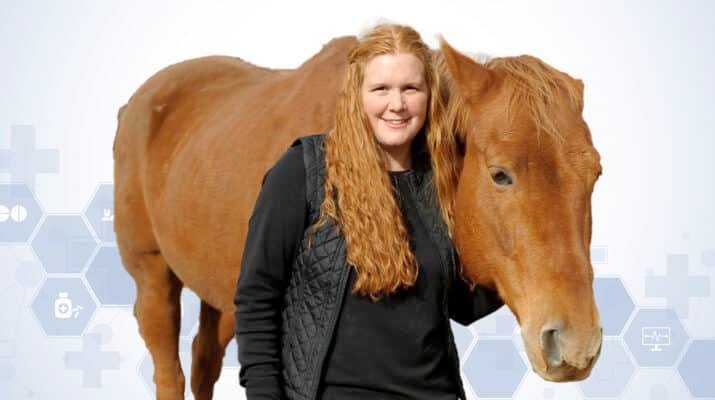Goats, donkeys, a camel, horses, alpacas, chinchillas, rabbits, dogs, cats — all these are used to help kids in crisis at the Purpose Farm in Baldwinsville, says founder and volunteer executive director. She explains
By Mary Beth Roach
Q: Tell us about Purpose Farm, what is your mission?
A: We mentor kids ages 6 to 18 who are in crisis, and they work with animals that have come from similar circumstances of neglect, abuse, or have experienced some sort of trauma. It’s all free of charge.
Q: How long have you been doing this?
A: Since 2008, when God called us to do it, and we saw our first youth in 2012.
Q: You said God called you — how did that happen?
A: We [Sandra; her husband, Howard, and three of their children] took a mission trip in 2008 to Romania, and we used to pass by a horse farm on the way to the orphanage. I thought that’d be a great idea to bring the kids from the orphanage out to the horse farm to get away for a while. But that would never happen in Romania. And then we came back home, I was driving in my car to work, and I heard Erin Maxwell’s story on the radio and I just cried out loud, ‘God, what can I do to save these kids before it gets to the situation with Erin Maxwell?’ And he said, ‘You can do your horse farm idea here in Central New York.’ [Erin Maxwell was a young girl from Palermo, whose stepbrother was imprisoned for her 2008 death; her father and stepmother served jail time for endangering the welfare of a child. According to authorities, the family home had horrible living conditions.]
Q: Did you have any farming or horse experience?
A: Actually, I’ve gone through a lot of the same trauma that the kids that we see have gone through. And I had kids as a teenager. I actually started riding at age 30 after my fourth kid, and I just immersed myself entirely into it.
Q: What are some of the animals on the farm?
A: We have goats, donkeys, a camel, horses, alpacas, chinchillas, rabbits, dogs, cats.
Q: What was your life previous to this?
A: Previously we lived in the suburbs, in East Syracuse. My husband owns a plumbing company, and I cleaned houses for a living. We sold our house, our possessions. We had a camp, renovated it, and sold that. That was what enabled us to purchase the property that is now Purpose Farm. That was a total renovation job as well.
Q: The kids who visit the farm — where do they come from and how is the mentoring experience?
A: The kids come from a variety of different areas — word of mouth throughout the community. We also get references from psychiatrists. Social Services will refer people to us; Hillside, Toomey House, Elmcrest, different group homes.
It’s a youth mentoring program basically. The youth will come on a weekly or biweekly basis because we want to build a relationship with them. We don’t want it to be a one-and-done. They have severe trauma. Most of them don’t have friends or a good family unit. So that’s what this becomes to them. We start in the beginning of the session with a small chore. It helps them to learn not only to give back to the community, but it also shows them how to care for something other than themselves. That’s where empathy starts forming. And it also gives us time to talk with them a little bit. From there, it might be taking the pig down to the river for a walk, or grooming a horse. It depends on where the kids are mentally and what I think that they can handle.
Q: Who does the mentoring?
A: It’s me and my daughter, Raven.
Q: How many kids do you usually have in a week, let’s say?
A: We break it down by sessions, basically about 130 to 160 sessions per year. They’re recurring.
Q: From your experience, what is it about the connection between kids and animals?
A: They are grateful to be here in a safe environment, that somebody is listening to them. They talk consistently the whole time. The animals teach them responsibility, getting them outside of themselves. When you’re working with an animal, you’re totally consumed with that. They also see what the animals have gone through. The kids see that, they relate to it, and then they start talking about their trauma. The feedback that we’ve heard is that they start to be nicer to other people in their classrooms. It softens them and they start to think about other things that are happening around them versus pulling back into their anger and into themselves.
For more information on Purpose Farm, visit www.purposefarm.org.

